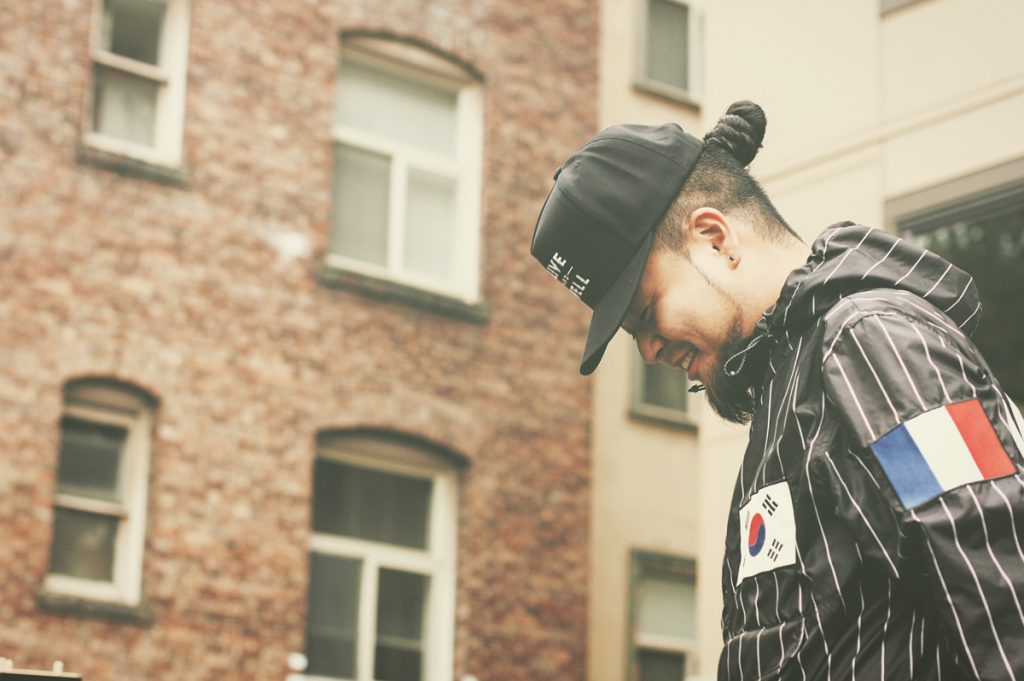When we recently caught up with spoken word artist and emcee G. Yamazawa, he had just landed in Juneau ahead of a show at the University of Alaska.
While you may think that Alaskan college students are not the natural audience for an artist who focuses on telling stories about his Japanese-American and Buddhist background, Yamazawa says his act often introduces his audience to the everyday aspects of being an Asian-American Buddhist in the United States.
“I grew up in North Carolina, so I got used to not having an Asian American audience at an early age,” Yamazawa told Tricycle, adding that his classmates were primarily African American and white. “I’m used to telling my story and having a conversation about cultural identity. But what’s great about performing for college audiences is that people can relate to different aspects of my story. It makes them think.”
The child of Japanese immigrants who ran a local sushi restaurant, Yamazawa, 25, remembers learning to chant at a very early age. “My dad was an extremely strict Japanese father,” he recalled. “And North Carolina is a very spread out place, so not only was I often the only Buddhist in my school, I was also the only Asian. I guess that’s what made me so different.” In fact the only Asian kids he knew, Yamazawa said, were from Soka Gakkai International.
Yamazawa said that while he chanted and performed other rituals with his family throughout his childhood, it often felt like a rote experience. “I rejected it [for a long time]. But when I was 17 I got kicked out of high school because I was caught up in the wrong crowd,” he said. “I was really going down the wrong path at that moment, and I really needed to take charge of my own life and work on all the aspects that I didn’t like.”
During this period of deep soul searching, Yamazawa found himself returning to the Nichiren Buddhist faith of his family with a renewed enthusiasm. “I wanted to take my life in a different direction and chanting was the only tool that I knew,” he said. Yamazawa eventually graduated from a continuation school and went on to community college. It also was during this period of transformation that Yamazawa began to seriously write poetry. His work often explores themes of family, faith, and identity.
One of his big breaks came in 2014, when as a member of the Washington DC-based Beltway Poetry Slam, he beat 71 other teams to win the National Poetry Slam. Since then, Yamazawa has released a self-titled EP and continues to work as an emcee as well as a spoken-word artist.
“A lot of my poetry really honors my family,” Yamazawa said. “They’ve always supported the fact that I chose a creative life.”
.embed-container { position: relative; padding-bottom: 56.25%; height: 0; overflow: hidden; max-width: 100%; } .embed-container iframe, .embed-container object, .embed-container embed { position: absolute; top: 0; left: 0; width: 100%; height: 100%; }
In his poem “Dear Grandma,” Yamazawa movingly describes his immigrant grandmother’s role in his life and the impact of her presence at his birth. “It’s really cool to initiate conversations about Buddhism” through his family’s stories and his poetry, Yamazawa said. “What I would love to start doing is more interfaith dialogue.”
As he tours colleges and universities throughout the United States, Yamazawa says he wants to continue to have these conversations about faith and community with the young people he meets each day.
“Buddhism to me can really mold and transfuse with literally any religious faith and can be incorporated into anyone’s life,” Yamazama explained. “I would like to continue seeking a deeper sense of self and ways to be a better person while helping people to recognize the power that they have.”
Thank you for subscribing to Tricycle! As a nonprofit, we depend on readers like you to keep Buddhist teachings and practices widely available.
